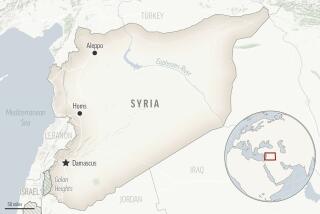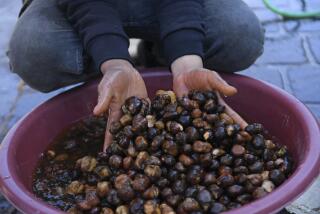Syria: Some in opposition fear rebels miscalculated in Aleppo
ALEPPO, Syria — In million-dollar apartments in a neighborhood of the city as yet unscathed, the battle for Aleppo plays out daily on flat-screen TVs. Amid imported sofas and abstract art, the revolution doesn’t seem so close.
But as the call for night prayers rang out from the minaret of the nearby mosque on a recent day, two loud explosions boomed.
“Do you hear that?” a father of seven asked, briefly looking away from the TV. “It’s like this every night.”
From the balcony, which on this night let in a little cool summer breeze, his family can occasionally see smoke rising above other Aleppo neighborhoods that are under attack by forces loyal to President Bashar Assad.
The father is solidly opposed to Assad, but he fears the prospect of rebels who have filtered in from the suburbs seizing his neighborhood as they try to take Syria’s largest city and commercial hub.
“What [the rebels] did was wrong, coming in and forcing all these civilians to flee and live in schools. You came to protect civilians, but now you’re hurting them?” said the father, one of the city’s merchants. “It’s wrong what they did.”
As the fighting intensifies in a city once regarded as immune to the violence racking much of Syria, some opposition activists are concerned that those who have taken up arms against Assad have made a serious miscalculation here. They fear that the offensive is creating a humanitarian crisis they are ill-equipped to handle and turning many of those affected against the rebels.
“The military campaign for Aleppo came too, too early,” said Marcell Shehwaro, a dentistry graduate and a prominent activist. “Because people here didn’t see the government violence that would make them believe the Free Syrian Army was needed.”
Even now, weeks into the battle for Aleppo, the traffic of everyday routines still snarls roundabouts in safer parts of the city. Syria’s national flag still flies freely here, and the walls are devoid of antigovernment graffiti that festoon rebel-held areas.
Pricey restaurants in nice neighborhoods open — expectantly — every night.
Abdulaziz “Abu Jumuah” Salameh, who heads a coalition of dozens of militias called the Al Tawheed Brigade, acknowledged that the city may not have wanted the rebel offensive to begin so soon. But that didn’t matter: The revolution has its own timing.
“Other provinces finished their revolution, and Aleppo hadn’t started yet,” he said, speaking from his headquarters in Tal Rifaat, a town north of the city. “You could wait 100 years, and Aleppo still won’t be ready.”
Even as rebels continue to stream into Aleppo, there is bitter disagreement over whether they can win over its residents.
*
The park was full, but few customers made their way to the man selling balloons and small bags of cotton candy from his cart.
Throughout Aleppo’s Ashrafieh park, families had spread out their belongings on blankets or hung them from the trees that provided a bit of relief from the summer sun. They had been here for days, refugees in their own city, poor people forced to flee fighting in other parts of Aleppo.
Just a couple of months ago, most opposition protests in Aleppo didn’t last for more than half an hour. Now some streets are lined with crumbling buildings. Most public transportation has disappeared, and few taxis or microbuses are still operating. Gasoline is scarce.
“For so long, Aleppo residents said, ‘Nothing is happening, nothing is happening.’ They can’t say that anymore,” Ali, a rebel and former carpenter from the embattled Salahuddin neighborhood, said as he walked past homes missing chunks of concrete and surrounded by piles of reeking garbage.
Activist Shehwaro, a member of the Christian minority, which has tended to view Assad as a protector, said that many of the internally displaced refugees she talks to blame the rebels for their situation. Others agree with that assessment.
“Seventy percent of the refugees here are pro-regime, or at least pro-stability,” said the director of a school being used to house the displaced. “We are helping people who are still supporting the regime.”
Just like at dozens of other schools across the city, old wooden desks filled the courtyard at the Hoda al Eishrawi school to make room for thin foam mattresses in each classroom. Children splashed one another with water to keep cool in the heat until a school director yelled at them. Water shortages have been a big problem.
Nearby, a cook stirred a huge black caldron full of chopped squash, eggplant and ground beef.
“This is our backup” in case anticipated food donations from the community don’t arrive, said the director, who didn’t want his name used for fear of government backlash.
Dormitories at Aleppo University, stormed not long ago by security officers who killed several students, also were crammed with families. In the courtyard where students and faculty were assaulted by shabiha militiamen, children played games.
Tony al Taieb, a law school student and media activist, said he and many others in the opposition resented not being given at least a warning of the rebels’ impending offensive. They might have at least had a chance to better prepare for the humanitarian crisis, he said.
It’s too late to worry about that. He now works alongside the newly formed Aleppo Military Council, which is coordinating the rebel offensive.
“Once the Free Syrian Army came in, I left the computer, and my work became on the ground,” he said. “There’s no point to going out and protesting anymore; who’s going to come out and protest under this shelling?”
But he said he fears a repeat of what happened in Damascus, where rebels withdrew from neighborhoods after announcing a push to liberate the capital.
“It’s done, we’ve come in, so we can’t destroy the city and leave, it will ruin our reputation,” he said. “We have to stay or else it’s suicide.
“If we leave Aleppo, the revolution will fall apart.”
*
When a rebel named Zakaria heard that two government rockets had hit his neighborhood in northeast Aleppo, his first reaction was “Thank God.”
He paused, then laughed as he considered how ridiculous that seemed.
“The people of Aleppo need to wake up,” said Zakaria, who works with the Aleppo Military Council.
He believes that only by witnessing wanton destruction by forces loyal to Assad in their own backyard — rather than just watching propaganda on state television — will Aleppo’s residents fully support the rebels.
But it doesn’t help that the majority of the rebels now making the streets their battlefield and squatting in schools and empty homes aren’t sons of the city but rather come from the suburbs.
“Where are the people of Aleppo?” asked Abu Rayan, an engineering student-turned-fighter from Idlib province, while standing on the front lines in Salahuddin. “If you gathered all the fighters here, only two of them would be from Aleppo.”
Salameh, the Al Tawheed Brigade commander, is dismissive of the reluctant Aleppo residents, underscoring the feeling that this battle is in part about the countryside trying to force its will on the city. People from the towns and villages, who have borne the brunt of the violence, appear to think it is time for Aleppo to share their pain.
“They may want stability, but we don’t want this kind of stability,” said Salameh, speaking of the city dwellers from his headquarters 20 miles away. “We can’t allow for people to be slaughtered in other neighborhoods as they are still sitting.”
More to Read
Start your day right
Sign up for Essential California for news, features and recommendations from the L.A. Times and beyond in your inbox six days a week.
You may occasionally receive promotional content from the Los Angeles Times.






